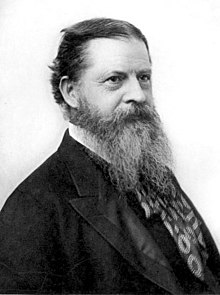चार्ल्स सैंडर्स पियर्स
 चार्ल्स सैंडर्स पियर्स | |
| Born | 10 सितम्बर,1839 in Cambridge, Massachusetts |
|---|---|
| Died | April 19, 1914 (aged 74) in Milford, Pennsylvania |
| Nationality | American |
| Fields | Logic, Mathematics, Statistics,[1][2] Philosophy, Metrology,[3] Chemistry, Experimental psychology[4] Economics,[5] Linguistics,[6] History of science |
| Religious stance | Episcopal (unconventional)[7] |
चार्ल्स सैंडर्स पियर्स अमेरिकी दार्शनिक , तर्कशास्त्री , गणितज्ञ , और वैज्ञानिक थे।
सन्दर्भ
- ↑ Hacking, Ian (1990), "A Universe of Chance", The Taming of Chance, pp. 200–215, Cambridge U. Pr.
- ↑ Stigler, Stephen M. (1978). "Mathematical statistics in the early States". Annals of Statistics. 6: 239–265 [248]. JSTOR 2958876. MR 0483118. डीओआइ:10.1214/aos/1176344123. मूल से 20 जुलाई 2015 को पुरालेखित. अभिगमन तिथि 27 जुलाई 2015.
- ↑ Crease, Robert P (2009). "Charles Sanders Peirce and the first absolute measurement standard: In his brilliant but troubled life, Peirce was a pioneer in both metrology and philosophy". Physics Today. 62 (12): 39–44. डीओआइ:10.1063/1.3273015. मूल से 12 जनवरी 2013 को पुरालेखित. अभिगमन तिथि 27 जुलाई 2015.
- ↑ Cadwallader, Thomas C. (1974). "Charles S. Peirce (1839-1914): The first American experimental psychologist". Journal of the History of the Behavioral Sciences. 10 (3): 291. डीओआइ:10.1002/1520-6696(197407)10:3<291::AID-JHBS2300100304>3.0.CO;2-N.
- ↑ Wible, James R. (2008), "The Economic Mind of Charles Sanders Peirce Archived 2012-10-23 at the वेबैक मशीन", Contemporary Pragmatism, v. 5, n. 2, December, pp. 39-67
- ↑ Nöth, Winfried (2000), "Charles Sanders Peirce, Pathfinder in Linguistics Archived 2012-04-26 at the वेबैक मशीन", Digital Encyclopedia of Charles S. Peirce Archived 2007-12-05 at the वेबैक मशीन.
- ↑ Joseph Brent (1998). Charles Sanders Peirce: A Life (2 संस्करण). Indiana University Press. पृ॰ 18. आई॰ऍस॰बी॰ऍन॰ 9780253211613. अभिगमन तिथि 2012-09-24.
Peirce had strong, though unorthodox, religious convictions. Although he was a communicant in the Episcopal church for most of his life, he expressed contempt for the theologies, metaphysics, and practices of established religions.